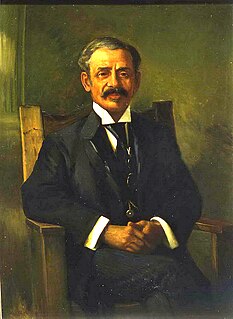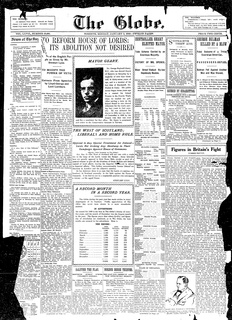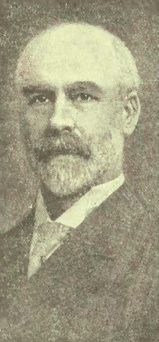
William Peyton Hubbard, a City of Toronto alderman from 1894 to 1914, was a popular and influential politician, nicknamed Cicero for his oratory; he was the first politician of African descent elected to office in Canada.
Municipal elections were held in Toronto, Ontario, Canada, on December 4, 1950. It was the second time the elections were held in December ; traditionally elections occurred on New Year's Day. Incumbent mayor Hiram E. McCallum narrowly defeated Allan Lamport. The defeat of Norman Freed and the failure of Charles Sims to regain his seat would bring to a close the communist Labor-Progressive Party's presence on Toronto's City Council though the party, and its successor, the Communist Party of Canada would continue to elect members as school trustees for several decades.
Municipal elections were held in Toronto, Ontario, Canada, on January 1, 1935. James Simpson won a surprise victory in the mayoral campaign to become the first socialist candidate elected to the office.
Municipal elections were held in Toronto, Ontario, Canada, on January 1, 1934. William James Stewart easily won reelection to his fourth term as mayor. This election also marked a major reduction in the size of city council. Previously each ward had elected three members, starting this year each ward had only two representatives.
Municipal elections were held in Toronto, Ontario, Canada, on January 2, 1933. William James Stewart was elected to his third term by the largest margin in city history.
Municipal elections were held in Toronto, Ontario, Canada, on January 1, 1932.
Municipal elections were held in Toronto, Ontario, Canada, on January 1, 1931. William James Stewart was elected mayor after winning a close contest again former mayor Sam McBride.
Municipal elections were held in Toronto, Ontario, Canada, on January 1, 1926. Thomas Foster was reelected mayor.
Municipal elections were held in Toronto, Ontario, Canada, on January 1, 1923. Charles A. Maguire was reelected to his second term as mayor.
Municipal elections were held in Toronto, Ontario, Canada, on January 1, 1919. Mayor Tommy Church was elected to his fifth consecutive term in office. This election marked the creation of Ward 8, covering the recently annexed areas of East Toronto. The representation of Ward 7 was also increased to have three alderman like every other ward.
Municipal elections were held in Toronto, Ontario, Canada, on January 1, 1918. Mayor Tommy Church was elected to his fourth consecutive term in office.
Municipal elections were held in Toronto, Ontario, Canada, on January 1, 1917. Mayor Tommy Church was acclaimed to his third consecutive term in office.
Municipal elections were held in Toronto, Ontario, Canada, on January 1, 1916. Mayor Tommy Church was elected to his second term in office.
Municipal elections were held in Toronto, Ontario, Canada, on January 1, 1915. Tommy Church was elected mayor defeating Jesse O. McCarthy.
Municipal elections were held in Toronto, Ontario, Canada, on January 1, 1914. H.C. Hocken was reelected mayor defeating Fred McBrien. The election was also notable for the victory of Louis Singer, the first representative of Toronto's large Jewish community elected to city council.
Municipal elections were held in Toronto, Ontario, Canada, on January 1, 1912. Mayor George Reginald Geary faced no opponents and was acclaimed for reelection.
Municipal elections were held in Toronto, Ontario, Canada, on January 2, 1911. Mayor George Reginald Geary was easily reelected mayor.

Municipal elections were held in Toronto, Ontario, Canada, on 1 January 1910. George Reginald Geary was elected to his first term as mayor. Two plebiscites were passed:
- To build a tube and surface subway transit system;
- Election of Board of Education by wards.
Municipal elections were held in Toronto, Ontario, Canada, on January 1, 1909. Joseph Oliver was easily re-elected to his second term as mayor. One of the central issues of the campaign was whether the city should construct a bridge over the Don River connecting to Danforth Avenue. A referendum was held as part of the vote, and the bridge was approved. It would be built as the Prince Edward Viaduct.




